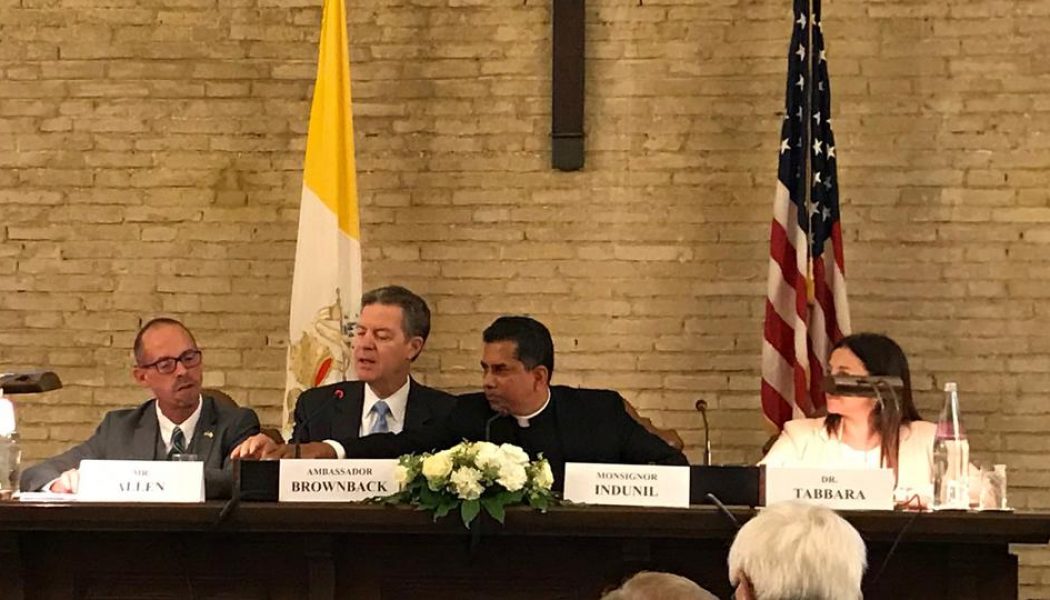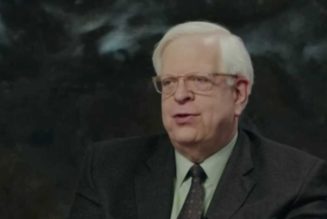
ROME – While in the abstract it may seem the case for religious freedom and protecting vulnerable religious minorities ought to be based on virtue and morality, the U.S. Ambassador at Large for International Religious Freedom believes something else is bringing governments around today: Cold, hard cash.
“If you want to grow an economy and build something,” Sam Brownback told Crux, promoting religious freedom is essential.
“Money is a chicken, it won’t go where there’s a conflict,” he said. “You’ve just ruled yourself out of a whole bunch of investment if you’ve given in to this monochromatic view of religion, that it has to be this [way] and everybody else we punish. You’ve just really frozen yourself out of the global economy and you’re not going to grow.”
“You’re seeing a lot more governments saying this is a really bad model,” Brownback said.
At the same time, Brownback insisted that a recent U.S. trade deal with China does not create economic incentives cutting in the opposite direction, suggesting that despite objections to China’s religious freedom track record, the U.S. is still willing to do business with the country.
“I think what it really says is that we’ve got a multi-dimensional engagement difficulty with China, but we’re not giving up on the human rights piece of that because there’s a trade agreement,” he said.
“We will continue to push it, and we will push it with the tools we have,” Brownback said.
Brownback spoke Jan. 16 to Crux in Rome, while in town for a conference hosted by the city’s prestigious Jesuit-run Gregorian University on the Abrahamic Faiths Initiative, an effort to promote solidarity among Jews, Christians and Muslims.
A former U.S. Senator and Governor of Kansas, Brownback was appointed to his present post by President Donald Trump in 2017.
Brownback cited Central Asia, especially Uzbekistan and Kazakhstan, as one place where the economic and strategic case for religious freedom is making a difference.
“I think they’re going to continue pushing the neighborhood to be much more open and move away from the former Soviet-style police state,” he said.
He also pointed to the Balkans as a “really interesting opportunity for religious freedom.”
“It’s stabilized, and now it needs repentance and reconciliation efforts so people can’t go back in and ignite the old hatreds that have been so flammable in the past,” he said.
Describing himself as optimistic that the trend lines on religious freedom are moving in the right direction, Brownback even said he’s had positive conversations with Pakistani leaders, despite the fact that Pakistan has been “a very problematic place for a number of years now.”
Among other things, Pakistan is where an illiterate Catholic farmworker and mother of four named Asia Bibi spent a decade on death row for the alleged crime of blasphemy against the Prophet Mohammed until mounting international pressure resulted in her release and relocation to Canada in May 2019.
“They’re seeing the futility and the harm this does to their nation,” Brownback said.
On China, Trump’s top religious freedom official said that trading arrangements and human rights disputes should be separate matters.
“I’ve talked directly with our trade negotiator, I’ve talked with all the trade people,” he said. “They understand these are different buckets of issues. Their only request is that you don’t deal with the human rights bucket in the trade negotiations.”
Brownback rejected the idea that a trade agreement should have been conditional on specific measures of progress from China on religious freedom and other human rights protections.
“I’m not sure how you measure progress on human rights issues,” he said.
“You can figure out the trade deal … you lift this on soybeans, and we’ll lift tariffs we’ve got on imported products coming in from China. It’s comparatively easy,” Brownback said. “On human rights, we’re talking about a need for them to change what they’re doing wholesale.”
“They’re at war with faith,” he said. “It would be very difficult to calibrate within these different sectors.”
At the same time, Brownback expressed gratitude to Trump for greenlighting continuing efforts to pressure China on religious freedom, despite blowback from some U.S. officials concerned about the potential impact on other fronts.
“I’m delighted that we’re on the playing field. There were those who wanted to keep us off the playing field altogether, saying, ‘We don’t want to talk about human rights right now, we’ve got a trade deal in dispute.’ But the president has been fully supportive,” he said.
While Pope Francis often has referred to an “ecumenism of blood” in the early 21st century, meaning a sense of common cause among the various branches of Christianity because their persecutors don’t make denominational distinctions, Brownback said there’s also a “dialogue of blood” among religions for much the same reason.
“You’ve got a million Muslims locked up for being Muslims in China,” he said. “There are 700,000 Muslims who were kicked out of Burma for not being Buddhist. There are radical efforts in India effecting a large scale of non-Hindus. That’s what’s really catching the attention of the whole world.”
In the end, Brownback voiced conviction that the case for religious freedom ultimately will prevail – ultimately, he seemed to say, because there’s no other choice.
“The bad guys have gotten out there ahead of us, and they’re stirring a lot of ill,” he said. “It’s usually among people who are less informed about their faith, not more … it’s more of an indentificational faith.”
“But we have truth on our side,” Brownback said. “We’re either going to figure out how to get along or we’re going to kill each other.”
Follow John Allen on Twitter: @JohnLAllenJr
Crux is dedicated to smart, wired and independent reporting on the Vatican and worldwide Catholic Church. That kind of reporting doesn’t come cheap, and we need your support. You can help Crux by giving a small amount monthly, or with a onetime gift. Please remember, Crux is a for-profit organization, so contributions are not tax-deductible.







